Nigeria’s naira ranked third among the world’s worst performing currencies this year, a Bloomberg report said.
Of the 151 currencies tracked by Bloomberg this year, naira was the world’s worst performer after the Lebanese pound and the Argentine peso, after closing at N1,043 per $1 on Thursday — about 72 hours to the end of 2023.
The naira eventually closed at N907.11 per $1 Friday, data published on the website of the FMDQ showed, but it closed at N1,193 per dollar at the unofficial window on Friday, according to data sourced from the black market.
While financial analysts have predicted that the naira may plunge further in 2024, the naira’s performance this year has been described as its worst year since the return to democracy in 1999.
Foreign reserves in Africa’s biggest crude producer are at the lowest in six years with most of them encumbered by overdue short-term overseas obligations, Bloomberg noted in its report Thursday.
According to Vetiva Capital Management Ltd, the naira may slip further unless President Bola Tinubu’s government lures international investors or ramps up oil output.
“A significant rise in external reserves, material increase in foreign exchange inflows, and reduction in money supply” will be positive for the naira, Vetiva Capital said in a note to clients.
Background
The depreciation witnessed by the naira across both the official and unofficial markets this year followed the Central Bank of Nigeria’s move to unify the nation’s multiple fx windows.
In June, the CBN announced the unification of all the segments of the country’s FX window to allow the local fiat to trade more freely.
The CBN also announced the reintroduction of the “Willing Buyer, Willing Seller” model at the I&E window, which allows eligible transactions to access foreign exchange based on the guidelines outlined in the circular dated 21 April 2017.
All of these, combined with the ripple effect of the cash crunch recorded in the wake of the naira redesign policy of the apex bank earlier in the year also contributed to the inflationary pressure in the country.
Nigeria’s inflation figure according to data released last month by the country’s statistics office, NBS, stood at 28.2 per cent, while the benchmark interest rate remained at 18.75 per cent.
READ ALSO: Governor Lawal presents 423Billion naira ‘Rescue Budget’
Analysts opine that the concerns have deterred foreign investors from the country amid foreign exchange scarcity.
Meanwhile, the naira closed at the official market last year at N461.50 per $1, but slipped to N907.11 to a dollar at the close of business this year. This implies 96.6 per cent depreciation from the rate recorded in the preceding year.
Support PREMIUM TIMES’ journalism of integrity and credibility
Good journalism costs a lot of money. Yet only good journalism can ensure the possibility of a good society, an accountable democracy, and a transparent government.
For continued free access to the best investigative journalism in the country we ask you to consider making a modest support to this noble endeavour.
By contributing to PREMIUM TIMES, you are helping to sustain a journalism of relevance and ensuring it remains free and available to all.
Donate
TEXT AD: Call Willie – +2348098788999










